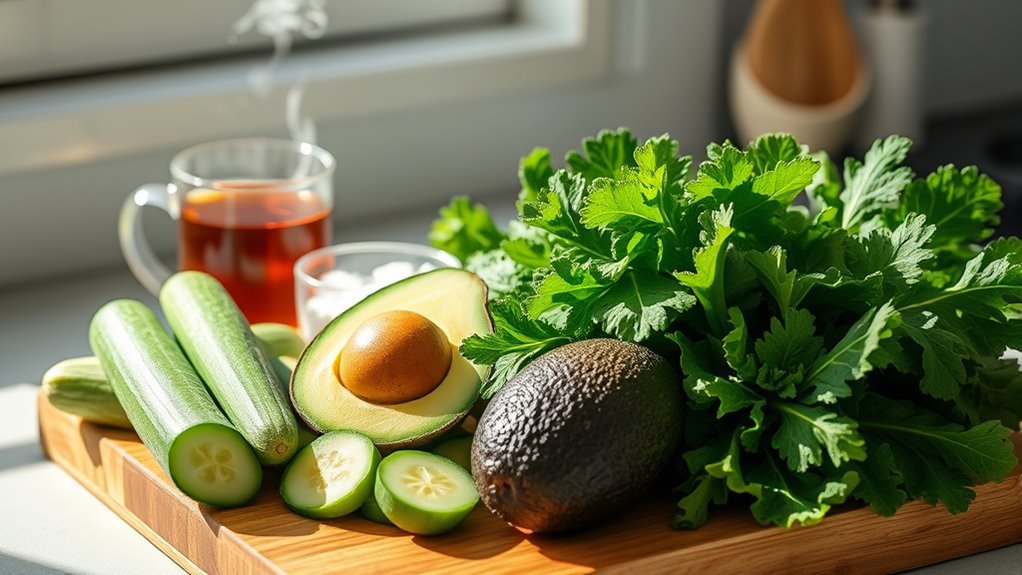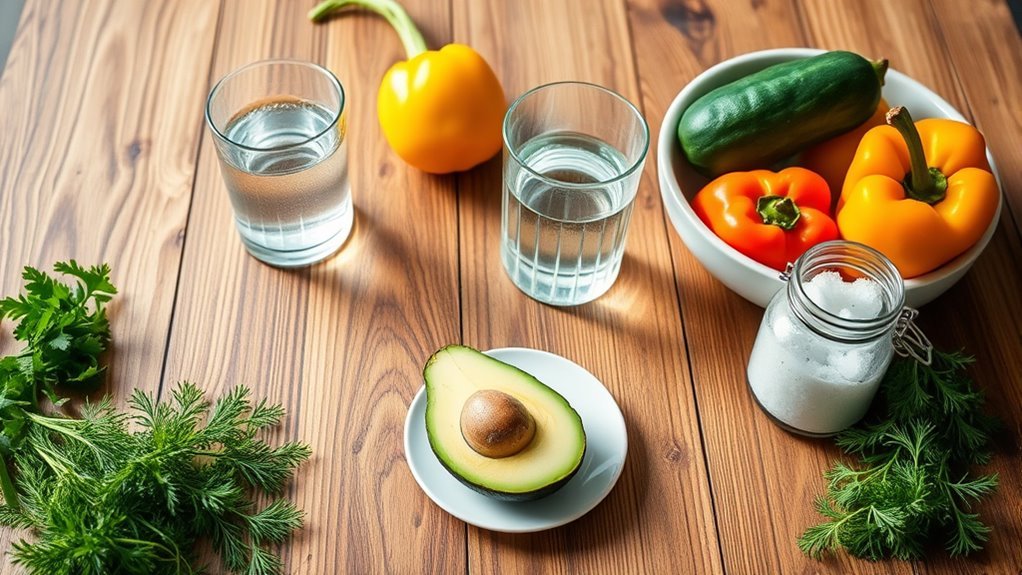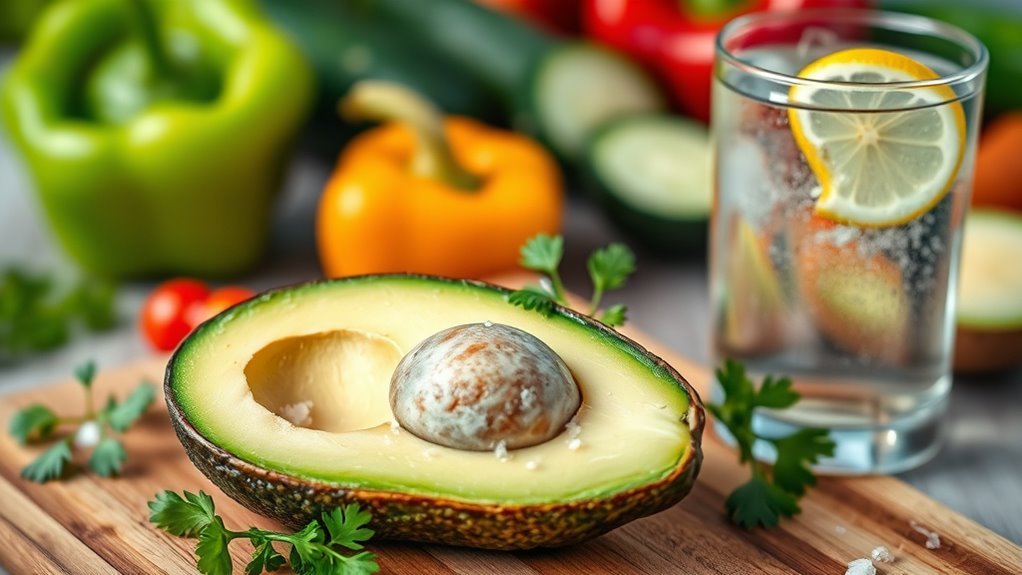To get rid of bloating on keto, start by identifying common culprits like dairy, nuts, and high-fiber vegetables. Stay hydrated and balance electrolytes with water-rich foods and supplements. Incorporating probiotics can improve gut health and reduce discomfort. Gradually increase your fiber intake to ease digestion, and avoid processed foods and additives that may upset your stomach. Practicing mindful eating can help too. Explore more effective strategies to help you feel better on your keto journey.
Understanding Bloating on a Keto Diet

When you start a keto diet, you might experience bloating, which can be frustrating. This discomfort often stems from changes in your keto digestion as your body adapts to a low-carb, high-fat lifestyle. One common bloating cause is the increased intake of fats, which can be harder for some to digest, especially if you’re not used to it. Additionally, many keto-friendly foods, such as dairy and certain vegetables, can contribute to gas and bloating. As your gut microbiome adjusts, you may also notice temporary bloating. Staying hydrated, gradually increasing fiber intake, and choosing easily digestible fats can help manage these symptoms. Understanding these factors empowers you to enjoy your keto journey without unnecessary discomfort.
Identify Common Keto Foods That Cause Bloating

As you navigate the keto diet, it’s important to be aware of certain foods that may contribute to bloating. Dairy products, especially for those who are lactose intolerant, can cause discomfort. Some nut varieties, like almonds and cashews, may also lead to gas if consumed in large portions. Additionally, artificial sweeteners like erythritol can upset your stomach. While low carb vegetables are generally healthy, certain types like broccoli and cauliflower can cause bloating for some. Pay attention to meal timing and portion sizes; eating too quickly or in large amounts can exacerbate bloating. Finally, consider your cooking methods—frying and heavy sauces may not sit well. By identifying these triggers, you can enjoy a more comfortable keto experience.
Stay Hydrated to Reduce Bloating

Staying hydrated is essential for reducing bloating, especially on a keto diet. When you’re properly hydrated, it helps maintain your electrolyte balance, which can prevent water retention and digestive discomfort. Make sure you’re drinking enough water throughout the day to support your body’s needs and promote better digestion.
Importance of Water Intake
Although many people overlook it, proper hydration plays an essential role in managing bloating, especially on a ketogenic diet. Staying hydrated helps your body eliminate excess sodium, reducing water retention. Plus, incorporating water-rich foods like cucumbers, lettuce, and zucchini enhances hydration benefits, further alleviating bloating.
Here’s a quick look at hydration sources:
| Source | Water Content | Hydration Benefits |
|---|---|---|
| Cucumber | 95% | Low-calorie, invigorating |
| Lettuce | 96% | Nutrient-rich, filling |
| Zucchini | 94% | Aids digestion, low-carb |
Make sure you drink enough water daily. It’ll help you feel lighter and more energized, allowing you to enjoy your keto journey with freedom!
Electrolyte Balance Matters
When you’re on a ketogenic diet, maintaining a balanced intake of electrolytes is essential for minimizing bloating. An imbalance can lead to water retention and discomfort, so staying hydrated and sourcing your electrolytes wisely is key. Here are three important electrolyte sources to evaluate:
- Sodium: Sea salt or bone broth can help replenish sodium levels, aiding in fluid balance.
- Potassium: Foods like avocados and leafy greens provide potassium, which supports proper cell function.
- Magnesium: Nuts, seeds, and dark chocolate are great sources of magnesium, helping with muscle relaxation and digestion.
Incorporate Probiotics for Gut Health
Incorporating probiotics into your diet can greatly improve gut health, especially when you’re following a keto lifestyle. Probiotic benefits include enhancing your gut microbiome, which can be particularly helpful in reducing bloating. By restoring a healthy balance of gut bacteria, you can enjoy better digestion and overall comfort.
Here’s a quick comparison of popular probiotic sources:
| Probiotic Source | Probiotic Strains | Benefits |
|---|---|---|
| Yogurt | Lactobacillus, Bifidobacterium | Improves digestion, boosts immunity |
| Sauerkraut | Lactic acid bacteria | Supports gut health, reduces bloating |
| Kefir | Various strains | Enhances nutrient absorption, promotes gut balance |
Monitor Your Fiber Intake
Many people overlook the importance of fiber intake while on a keto diet, but it’s essential for managing bloating. A balanced fiber intake can help support digestion and reduce uncomfortable gas. Here are three tips to keep in mind:
- Choose the Right Fiber Sources: Focus on low-carb veggies like spinach, zucchini, and cauliflower. They’re packed with fiber and won’t kick you out of ketosis.
- Mix Fiber Types: Incorporate both soluble and insoluble fiber. Soluble fiber (like chia seeds) helps with digestion, while insoluble fiber (like leafy greens) adds bulk.
- Gradually Increase Fiber: If you’re not used to high fiber, slowly increase your intake to avoid gastrointestinal discomfort.
Avoid Processed Foods and Additives
Although it might be tempting to reach for convenient snacks and meals, avoiding processed foods and additives is essential for reducing bloating on a keto diet. Processed ingredients often contain refined carbohydrates that can disrupt your digestive system. Furthermore, artificial sweeteners and food additives might seem harmless, but they can lead to gas and discomfort for many people. Choosing whole, unprocessed foods allows your body to process nutrients more efficiently, minimizing bloating. Focus on fresh vegetables, high-quality proteins, and healthy fats to support your keto journey. By steering clear of these troublesome ingredients, you empower your body to function at its best, promoting a sense of well-being and freedom from discomfort. Enjoy the freedom to feel good by making mindful food choices!
Practice Mindful Eating Habits
By practicing mindful eating habits, you can markedly reduce bloating while following a keto diet. Here are three practical tips to help you:
- Mindful Chewing: Take your time to chew each bite thoroughly. This aids digestion and helps prevent swallowing excess air, which can lead to bloating.
- Portion Control: Be mindful of your serving sizes. Eating large portions can overwhelm your digestive system, so aim for smaller, balanced meals throughout the day.
- Limit Distractions: Try to eat without distractions like TV or smartphones. Focus on your meal to enhance your awareness of hunger cues, which can prevent overeating.
Consider Food Sensitivities and Allergies
If you’re experiencing bloating on a keto diet, it might be worth considering food sensitivities or allergies. Common triggers like dairy, nuts, and certain vegetables can lead to digestive discomfort. An elimination diet can help identify these culprits and guide you toward a more comfortable eating experience.
Common Food Triggers
When you’re on a keto diet, certain foods can trigger bloating, especially if you have underlying sensitivities or allergies. Understanding these common triggers can help you make effective dietary adjustments. Here are three key culprits:
- Dairy Products: Many people are lactose intolerant, leading to gas and bloating when consuming cheese or cream.
- Nuts and Seeds: While healthy, they can cause bloating for some due to their high fiber content.
- Cruciferous Vegetables: Foods like broccoli and cauliflower can be hard to digest, especially for those with sensitivities.
Identifying these bloating causes is essential for feeling free and comfortable on your keto journey. Adjust your diet accordingly, and enjoy a more pleasant experience!
Elimination Diet Approach
To effectively manage bloating on a keto diet, you might consider adopting an elimination diet approach to identify potential food sensitivities and allergies. This method can help you pinpoint specific elimination foods that may be causing discomfort. Start by removing common allergens from your diet, then gradually reintroduce them to observe how your body reacts. Here’s a simple table to guide you:
| Phase | Foods to Eliminate |
|---|---|
| Initial | Gluten |
| Week 1 | Dairy |
| Week 2 | Nuts |
| Week 3 | Nightshades |
| Week 4 | Eggs |
Frequently Asked Questions
Can Bloating Be a Sign of Ketosis?
Yes, bloating can be a sign of ketosis symptoms as your body adjusts to burning fat for fuel. When you switch to a low-carb diet, your digestive system might struggle with the new intake of fats, leading to temporary bloating. This can happen if you’re not producing enough digestive enzymes to break down those fats efficiently. Staying hydrated and gradually increasing fat intake can help your body adapt and reduce bloating over time.
How Long Does Bloating Typically Last on Keto?
Isn’t it ironic how something as simple as bloating can feel like a dramatic plot twist in your keto journey? Typically, bloating duration can last anywhere from a few days to a couple of weeks, depending on your body’s adjustment to keto symptoms. While it’s annoying, it often means your body is adapting to a new way of eating. Just hang in there, and remember, it usually gets better with time!
Are There Specific Keto Snacks That Reduce Bloating?
When considering keto snack options that might help reduce bloating, focus on low carb fiber sources. Foods like chia seeds, flaxseeds, and avocados can be great choices. They provide essential nutrients while promoting digestive health. You might also try fermented snacks, like kimchi or sauerkraut, which contain probiotics that support gut balance. Just remember to introduce any new foods gradually to see how your body responds, giving you more freedom to enjoy your keto journey.
Does Intermittent Fasting Help With Keto Bloating?
Intermittent fasting can be a double-edged sword; while it offers numerous benefits, it might also affect your body differently. When you combine it with a keto diet, you may find that the effects of both help regulate digestion and reduce bloating. Research shows that intermittent fasting can enhance fat metabolism and improve gut health, giving you a sense of freedom from discomfort. So, if you’re struggling, it’s worth exploring this approach.
Can Stress Contribute to Bloating on a Keto Diet?
Yes, stress can definitely contribute to bloating, even on a keto diet. When you’re stressed, your body’s digestive health can take a hit, leading to discomfort. Prioritizing stress management techniques like meditation or deep breathing can help alleviate this issue. By reducing stress, you may notice improvements in your digestion, allowing your body to process foods more effectively. Remember, a relaxed mind can lead to a happier gut and overall wellness.


